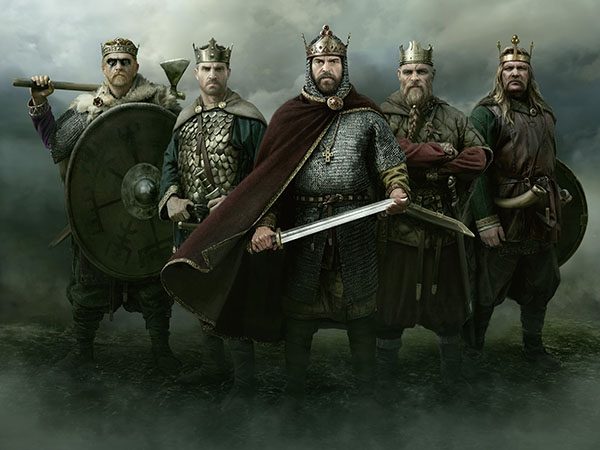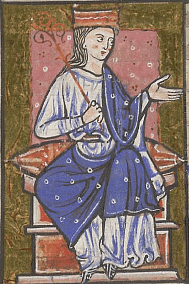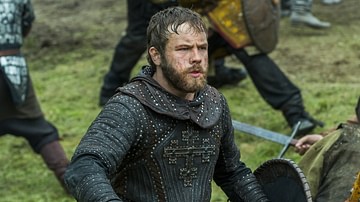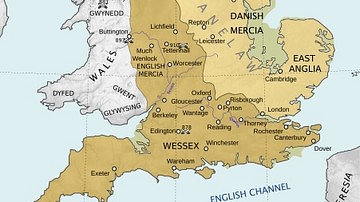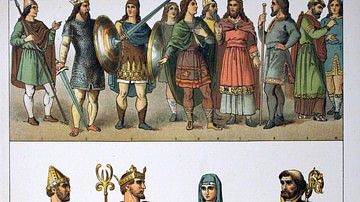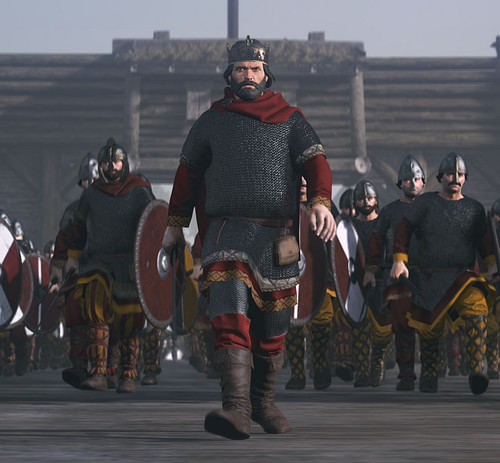
Alfred the Great (r. 871-899 CE) was the king of Wessex in Britain but came to be known as King of the Anglo-Saxons after his military victories over Viking adversaries and later successful negotiations with them. He is the best-known Anglo-Saxon king in British history thanks to his biographer Asser (died c. 909 CE) and that work's impact on later writers.
Alfred's epithet 'the great' was not given to him in his lifetime but centuries later when Asser's work became more widely known and the significance of Alfred's reign was more fully recognized. Even so, in his lifetime, Alfred was respected as a noble king who won the trust of his people for his reforms in education and law, and most notably, his leadership against the Viking threat. Alfred is featured in the TV series Vikings where he is played by Irish actor Ferdia Walsh-Peelo. The character in the show is loosely based on the historical Alfred but significant departures are made, most notably in his parentage.
The Vikings had begun their raids on Britain c. 793 CE and, by Alfred's time, had established themselves throughout the land from Northumbria through Mercia with increasing incursions into Wessex. Alfred defeated the Viking leader Guthrum (died c. 890 CE) at the Battle of Eddington in 878 CE, after which he was able to deliver terms including the Christianization of Guthrum and his closest advisors, thus bridging the religious gap between the two peoples. Although this victory did not end Viking raids in Britain nor drive the Vikings back to Scandinavia, it allowed for a period of relative peace in which Alfred's reforms could be implemented and take root.
Alfred's impressive military and administrative skills stabilized Britain after almost a century of Viking raids and warfare. He established the practice of translating classical works from Latin into English, set up public schools, reformed the military, and revised and expanded the law code. Later historians, especially during the Victorian Age, would consider him the most perfect king of the Middle Ages for his piety, justice, and noble vision of a better future for his people.
Youth & Rise to Power
Alfred was born in 849 CE, the son of King Aethelwulf of Wessex and his wife Osburh. At the age of four, his father sent him to Rome on pilgrimage, where he was confirmed in the faith by the Pope and, according to the Anglo-Saxon Chronicle, was anointed as king. Although it is possible this ceremony took place, it seems unlikely as Alfred was the youngest of five children and his older brothers – Aethelbald, Aethelberht, and Aethelred – would have all been in line to succeed to the throne before him.
Whatever effect the trip to Rome may have had on Alfred's character, it does not seem to be as profound an influence as that of his mother. Osburh is described in Asser's Life of King Alfred as a religious and intelligent woman who had a significant effect on his life-long interest in learning; a characteristic which chiefly defines Alfred and shaped his later accomplishments.
He learned poetry by hearing it recited and then repeating it but could not read it himself until sometime in his teenage years and even then could not read Latin in which the most important works of his time were written.
The role of his mother in his life, as well as his paternity, are the most significant departures made in Alfred's character arc in the TV series Vikings. In the show, his mother is Judith, Princess of Northumbria (played by English actress Jennie Jacques) who is married to Aethelwulf but becomes pregnant through an affair with the Christian monk-turned-Viking-turned-cleric, Athelstan (played by English actor George Blagden). Although the character of Judith is portrayed as caring and concerned for her son, no mention is made of Alfred's mother's impact on his literacy. His frailty in youth and the trip to Rome are also depicted with more or less accuracy but his brothers and their accomplishments are combined and fictionalized in the character of Aethelred (played by Darren Cahill) and elements of Aethelwulf's reign and personality are also significantly altered.
Alfred's brothers each ruled in succession following their father's death until Alfred was officially named successor to his brother Aethelred in c. 865 CE and elevated to the rank of military commander. It may be that Alfred's family had low expectations of him as a warrior-king as he was more given to books than action and was often ill as a young man (possibly afflicted with Crohn's disease). If so, they were mistaken as Alfred proved himself a capable leader in battle, between c. 865-871 CE, alongside his brother and on his own after Aethelred died.
The Viking Wars
In 865 CE the Great Army of Vikings led by Halfdane and Ivar the Boneless invaded East Anglia and swiftly defeated any force sent against them. In 866 CE they took the city of York, and in 867 CE they killed the Northumbrian kings Osbert and Aelle and consolidated their control of the region. In 868 CE they made constant raids throughout Mercia and by 869 CE had completely overrun East Anglia. In 870 CE reinforcements for the Great Army arrived from Scandinavia and Halfdane led his forces to take Wallingford, ravage Mercia, and drive on into Wessex the next year.
Aethelred and Alfred mobilized their forces and met the Vikings in battle at Reading but were badly defeated. Asser comments how “the Christians were aroused by the grief and shame of this, and four days later, with all their might and in a determined frame of mind, they advanced against the Viking army at a place called Ashdown” (Asser, 37, Keynes & Lapidge, 78). The Battle of Ashdown in January 871 CE would prove Alfred's skill in military leadership and his ability to think clearly and act in a crisis.
Although Asser never criticizes Aethelred directly, he makes the point that a strategy had been laid whereby Alfred and Aethelred would command joint forces which would strike at different points of the Viking forces but that Aethelred never appeared to take command of his part of the battle. The Vikings held the high ground and had already fortified their defenses when Alfred arrived on the field and found his brother the king was still at his prayers. Alfred, then, had no choice but to take command of the entire army and lead the attack. It should be noted that Asser's account of the battle has been challenged and other sources credit Aethelred with full participation in the engagement.
Whether his brother was involved or not, Alfred was victorious, skillfully leading his forces, and drove the Vikings from the field. Encouraged by this victory, the brothers pursued the Vikings and met them again at Basing but were defeated. In April, Aethelred died and Alfred became king. He led his army against the Vikings again at the Battle of Wilton and here again seems to have shown himself an effective leader on the field – at least at first. The Viking lines were broken and in flight, but there were too few of Alfred's forces to pursue. The Vikings were able to regroup and countercharge, defeating the West Saxons and taking the field. Alfred at this point had no choice but to pay the Viking commanders a large sum to leave Wessex.
Over the next few years, Alfred would continually have to mobilize what troops he could muster to defend his realm. Although the money he had paid to Halfdane secured Wessex for the time, it did not mean the Vikings had to leave Britain. They consolidated their power in Northumbria, made peace with the Mercians, and were free to threaten the autonomy of Wessex whenever they pleased. In 875 CE the Vikings had firmly established their kingdom, and a new Norse warlord, Guthrum, had taken command.
In 876 CE Alfred made a treaty with Guthrum in which he gave the Viking leader hostages, and the Vikings swore an oath to leave Wessex alone. For unknown reasons, the Vikings broke the treaty, killed the hostages, attacked, and then retreated to Exeter where they wintered. Alfred rallied his forces and blockaded the Viking fleet at Devon, forcing them to withdraw to Mercia but, by 877 CE, the Vikings were back at the borders and, in early 878 CE, they took Chippenham. The raid on Chippenham was a surprise attack launched during the Christmas season when Alfred was observing the holiday in the area and was completely unprepared. The Vikings massacred much of the populace, but Alfred escaped with his family and a few men and went into exile. Asser describes this period:
At the same time King Alfred, with his small band of nobles and also with certain soldiers, was leading a restless life in great distress amid the woody and marshy places of Somerset. He had nothing to live on except what he could forage by frequent raids, either secretly or even openly, from the Vikings as well as from the Christians who had submitted to the Vikings' authority. (Asser, 53, Keynes & Lapidge, 83)
Alfred & the Burnt Cakes
It is during this period that the events related in the legends surrounding Alfred are said to have taken place. Although it is often assumed that these legends come from Asser's work, they are all later creations, c. 10th century CE. The most famous of these is the story of Alfred and the burnt cakes, which comes from The Life of St. Neot.
It relates how Alfred, traveling alone at this time, came upon the cottage of a swineherd and asked for hospitality without revealing who he was. They took him in for a few days, and one day when the swineherd was out, his wife was baking bread in the oven while Alfred sat nearby preoccupied with his troubles. The wife was cleaning house when she smelled the bread burning and hurried to the oven to draw the loaves out. She chastised Alfred, who was sitting close by, saying, “You hesitate to turn the loaves which you see to be burning, yet you're quite happy to eat them when they come warm from the oven!” (Keynes & Lapidge, 198).
The story would go through many different incarnations with the wife depicted as evil and ignorant or simply exasperated by her houseguest, but in all, Alfred's response epitomizes humility and grace. He never reveals himself as king or argues with the wife but accepts her scolding as appropriate and helps her bake the bread.
The Battle of Eddington
Alfred remained in exile, hiding from the Vikings, for less than three months, during which time he seems to have been preparing for an offensive against the Vikings through a network of spies and chieftains who remained loyal to him. By March, according to Asser, he was waging a successful guerrilla war against the Danes. By May of 878 CE, he had assembled a large enough force to meet the Vikings in battle. He had a fortress built at Athelney which formed a base of operations and seems to have used this to recruit men as well as to launch raids.

At some point in early May, he managed to draw the Vikings out of their stronghold at Eddington and defeated them in battle using the tactic of the shield wall. The Wessex forces would have held tight formations against the Viking onslaught and then counterattacked. The Vikings were driven from the field and fortified the defenses of their stronghold. Alfred, however, destroyed all of the crops surrounding the Viking defenses, killed all the men found outside, and took the cattle. The Vikings were left with whatever provisions they had inside and after two weeks of siege surrendered.
Alfred's terms were lenient: Guthrum and 30 of his chieftains would submit to Christian baptism and renounce their pagan faith, hostages would be provided to ensure compliance, and the Vikings would leave Wessex; all of these conditions were met. Wessex was secure for the time being, but there is no evidence that Alfred thought Eddington had put an end to his Viking troubles.
Restoration, Reform, & Education
The theory that Viking raids were the wrath of God had gone unchallenged since the Lindisfarne raid in 793 CE as there was no better available, and Alfred most certainly believed it. Following the Battle of Eddington, he went to work to resolve the underlying causes of the raids which, in his view, were the poor state of education, clerical learning, and lack of unity in his kingdom.
Beginning in 880 CE, Alfred reorganized his kingdom and implemented educational, legal, and military reforms which would transform Wessex and eventually the whole of Britain. He began by rebuilding those cities and towns which had been destroyed in the Viking Wars and improving upon the earlier structures. Recognizing that these could be destroyed just as easily as their predecessors, he then reformed the military and the very structure of settlements in his kingdom.
Early in the 880's CE, Alfred implemented innovations which included a restructuring of the network of towns and cities. These initiatives are known as the Burghal System, in which improved roads linked a series of 33 burhs (fortified settlements) throughout his kingdom. On a trip to Rome, at some point after Eddington, Alfred had learned defensive tactics and stratagems from the Carolingian kings of France who had been dealing with their own Viking problems for centuries. Alfred's Burghal System seems to have been adapted from the Carolingian precepts.
In order for each burh to be able to defend itself, it had to be garrisoned, and those men had to be paid, and so Alfred reformed the tax code based on the abundance of crops gathered from a person's land. The productivity of a region was then taken into consideration when stationing a certain number of troops there. The burhs were situated in such a way that any garrison could move to support any other within a day's march.
At the same time, Alfred imported a number of learned clerics from Wales and France to reintroduce Latin learning to the court and translate Latin works into English. Public schools were created in which students learned to read English; those who were to go on to pursue holy orders would also be taught Latin. It was during this period that Asser, formerly of Wales, came to Alfred's court as his personal tutor. In time, Alfred himself would translate works from Latin to English, serving as a role model for his subjects.
It should not be thought, however, that this period was – as has often been claimed – a “quiet time” in which Alfred could devote himself to study and domestic policies. He was daily involved in foreign policy decisions, and the problems of the Vikings in Britain persisted. In the early 880's Alfred had gained control of Mercia, but the Vikings had settled the region from Northumbria known as the Danelaw and still made incursions into other regions.
Efforts to Unite England
In 886 CE Alfred captured London in a stunning victory, and “all the English people that were not under subjection to the Danes submitted to him” (Keynes & Lapidge, 38). There may have been an official oath of loyalty to the king that the populace, or at least landowners, had to take, but even if there was not, it is clear that Alfred had united the people of Britain under his rule. Keynes and Lapidge note that Alfred's victory at London marked “the emergence among the English of a sense of common identity, under a common leader, in a common cause” (38). Alfred was now king of all England not occupied by the Danes.
Shortly after taking London, Alfred sealed an alliance with Mercia by arranging a marriage between his daughter Aethelflaed (r. 911-918 CE) and the earl of that region, Aethelred II (r. 883-911 CE). It is certain they were married by 887 CE when Aethelflaed's name appears on land charters with Aethelred's. Aethelflaed would continue Alfred's work in conjunction with her husband and then as sole ruler and Lady of the Mercians.
Alfred continued his educational programs, enlarged and reformed the navy, and drew up his own law code based on the Christian Bible and founded on the Ten Commandments. All penalties took the form of fines except for those which involved crimes of treachery or treason. The supremacy of lordship was emphasized throughout as Alfred believed that the king ruled by divine will and, if he were true to his calling, would rule justly in the best interests of his people.
Although illiterate in his youth, Alfred himself wrote the law code and translated a number of works, including Gregory's Pastoral Care, Boethius' Consolation of Philosophy, St. Augustine's Soliloquies, and the first 50 psalms. All of these books had influenced Alfred personally for the better and so, he believed, would do the same for others.
By the time Alfred died, on 26 October 899 CE, he had transformed Britain from a disparate region of separate kingdoms to something resembling a unified nation. In spite of his accomplishments and fame, Alfred was not as highly respected at this time as he would come to be in later centuries, possibly because the Viking invasions would continue in Britain until c. 1066 CE.
Another important factor, however, is that Asser's Life of King Alfred was not widely read at this time since Asser never completed it or had it copied for distribution. The work was only brought to public attention in the 17th century CE when Sir John Spelman published it as a guide for kingly behavior. In the 18th century CE, Alfred was regarded as the epitome of a noble king, and by the time of the Victorian Period (1837-1901 CE), he was embraced as the founder of the British Empire, father of the British Navy (although he only reformed it), and the greatest king to ever rule England.
His educational reforms paved the way for public schools in England, his law code served as the basis for future legal reforms, and his restructuring of the cities, towns, and roadways changed the infrastructure of the country forever. His daughter Aethelflaed of Mercia would continue his war with the Vikings as well as his educational reforms and Burghal System along with her brother Edward of Wessex (aka Edward the Elder), who had succeeded Alfred. Edward's son, Aethelstan, would in time become the first King of England, reigning over a united land, and continue his grandfather's legacy.
